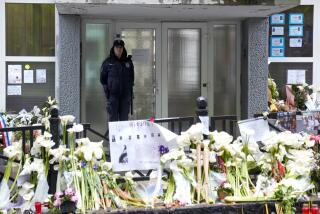143 Ethnic Albanians Leave Serbian Prisons
- Share via
PRISTINA, Yugoslavia — A cheering crowd welcomed 143 ethnic Albanians back to Kosovo on Wednesday after their release from Serbian jails earlier in the day.
The ethnic Albanians, known as the “Djakovica group” because most had been rounded up in the Kosovo town of that name and prosecuted together on terrorism charges, were ordered freed by the Serbian Supreme Court on grounds of procedural errors in their trial. A retrial was ordered, though the men are unlikely to face a Serbian court again.
The main welcoming ceremony was held in the village of Bec, about eight miles outside Djakovica, where thousands of exuberant family members and supporters greeted them. Albanian flags showing a black eagle on a red background fluttered in the breeze.
“Our sons! Our sons!” the crowd chanted, as some of its members broke through a line of relief workers, police officers and NATO-led peacekeepers to embrace the released prisoners. Some of the returning men flashed victory signs, and others looked tired.
The ex-prisoners were arrested and accused of terrorism during the North Atlantic Treaty Organization’s 78-day bombing campaign against Yugoslavia in 1999. The men, who were charged with having formed a unit of the separatist Kosovo Liberation Army, or KLA, and conducting attacks on government troops, were taken to Serbia proper when Yugoslav forces withdrew from Kosovo.
The province is still technically part of Serbia, Yugoslavia’s main republic, but has been under U.N. administration since the Yugoslav withdrawal.
Human rights lawyers argued that the men had been arbitrarily detained a day after a Serbian clash with KLA forces had ended and the guerrillas had faded into the countryside. The men were sentenced last May to prison terms of up to 13 years.
Continued detention of the group by the new democratic authorities in Belgrade, the Yugoslav and Serbian capital, after the Oct. 5 ouster of former President Slobodan Milosevic had been a subject of bitter complaint by ethnic Albanians, international human rights groups and Western governments. Milosevic was arrested April 1 on corruption charges and jailed.
Many of the returnees said they were happy to be free but expressed concern about other ethnic Albanians still held by the Serbs.
In Washington, State Department spokesman Philip T. Reeker said the release “is important to improving relations between the Belgrade government and ethnic Albanians in the region” because it “demonstrates . . . the Yugoslav government’s sincerity in dealing with some of these issues.”
Reeker urged Serbian authorities to “move expeditiously in releasing the remaining Kosovar Albanian political prisoners.”
International officials in the province estimate that between 200 and 280 ethnic Albanians from Kosovo remain in Serbian jails.
Fatmir Limaj, a spokesman for the Democratic Party of Kosovo, the main party formed out of the KLA when the guerrilla force was formally disbanded in 1999, described the released prisoners as “hostages” that the Belgrade leadership was gradually freeing in an attempt to represent itself as democratic.
“Holding Kosovars hostage after the war was done with a special purpose,” Limaj charged. “All this is part of a game with Kosovar prisoners, and there are still more there to be played with.
“What is the biggest absurdity about the war hostages is that [noted ethnic Albanian prisoner] Nait Hasani, sentenced to 20 years in prison by Milosevic and his totally controlled system, is being held in the same prison as Milosevic. Now tell me this is not a game.”
Hans Haekkerup, head of the U.N. administration in Kosovo, described the release as “a very important step” by the Belgrade authorities.
“I’m very happy--this shows that there is a difference between the new Serb regime and Milosevic,” Skender Tahir, 28, told Reuters news service after being released in the southern Serbian city of Nis.
“We were not harassed or beaten, but the conditions in the prison are very bad, the hygiene and food are terrible,” Fatos Deva, 28, told Reuters.
*
Times staff writer Holley reported from Sarajevo, Bosnia-Herzegovina, and special correspondent Gjoci from Pristina. Staff writer Robin Wright in Washington contributed to this report.
More to Read
Sign up for Essential California
The most important California stories and recommendations in your inbox every morning.
You may occasionally receive promotional content from the Los Angeles Times.













